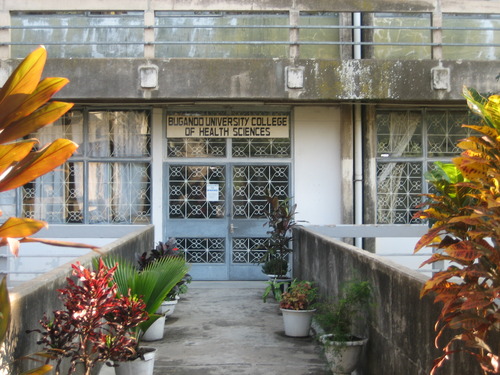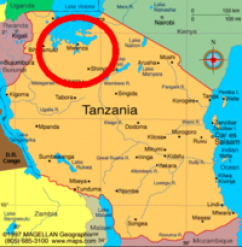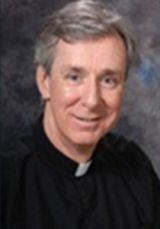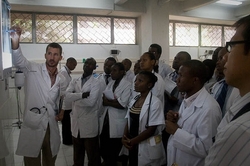Weill Cornell Bugando Program

Front entrance to Weill Bugando University College of Health Sciences in Mwanza, Tanzania.
Misson
The mission of the Weill Cornell Medicine program in Tanzania is to improve healthcare by strengthening the program at Weill Bugando School of Medicine and training the next generation of Tanzanian physicians and scientists.
Tanzania
Tanzania is located on the eastern coast of sub-Saharan Africa, with a population of approximately 69 million people (Fig. 1). Weill Bugando School of Medicine is located within the Bugando Medical Centre in Mwanza, northwest Tanzania. Mwanza, the second largest city in Tanzania, is located on the shores of Lake Victoria and is the capital of the Lake Zone and Western regions (Fig. 2). When Weill Bugando started in 2003, the country had 1 physician per 50,000 patients, the lowest ratio of physicians to patients in the world. Figure 3 shows a map of the world scaled to the ratio of physicians to the population of each country. This is compared to one physician per 390 patients in the United States.
 Map of Africa, Tanzania is located on the eastern coast of Africa.
Map of Africa, Tanzania is located on the eastern coast of Africa.
Map of Mwanza, Tanzania is located on the shores of Lake Victoria
History
Bugando Medical Centre (BMC) serves as the tertiary referral hospital for the people of the Lake and Western regions of Tanzania. BMC was built by the Catholic Church and was officially opened in December 1971. Since its inception, BMC local doctors and staff have shown an unwavering commitment to their patients. For example, Bugando Medical Centre was kept open despite the difficult conditions during the Ugandan-Tanzanian War from 1978 to 1979.
At present, Bugando Medical Centre is a 1,000-bed referral and teaching hospital employing approximately 950 people, serving about 19.6 million people. There are 18 clinical departments and six administrative departments.
The aspiration to build a medical college in Western Tanzania was put forth during the plenary Assembly of the Tanzania Episcopal Conference (TEC) in July 1994. After years of hard work, the Catholic University of Health Allied Sciences (CUHAS) opened in September 2003. The Medical School was named in honor of benefactors Joan and Sandford Weill in February 2007, becoming Weill Bugando School of Medicine. The Tanzanian educational system is modeled after that of the British. Medical education is preceded by 14 years of primary, secondary, and high school. The medical education consists of a five-year program. This is followed by a one-year rotating internship in medicine, pediatrics, surgery, and obstetrics and gynecology. Physicians may receive three years of additional specialized training (in anesthesiology, medicine, surgery, obstetrics and gynecology, and pediatrics) by pursuing a Masters of Medicine. This is equivalent to residency training in the United States.

Inauguration of Weill Bugando in Mwanza, Tanzania, February 2007.

Fater Peter Le Jacq
The relationship between Weill Cornell and Weill Bugando began over 20 years ago. Father Peter Le Jacq, M.D., an alumnus of Weill Cornell and also a Maryknoll priest, was an early force in the founding of the medical school.
Dr. Le Jacq worked as a physician and a priest at Bugando Medical Centre between 1987 and 1997, providing medical care and pastoral services. He also developed a home care program for HIV patients and their families. As the medical school was being developed, he assisted with curricular development and helped to form important partnerships with institutions in the United States.
Medical Education: Two Thousand Doctors Trained

Dr. Rob Peck teaching Tanzanian residents at Weill Bugando.
Weill Bugando School of Medicine opened in Mwanza, Tanzania in September 2003 and has been affiliated with Weill Cornell Medicine ever since. Its main teaching hospital is the Bugando Medical Centre. Dr. Robert Peck and Dr. Jennifer Downs are Weill Cornell Medicine faculty-physician that lead Weill Cornell’s efforts in medical education. An additional twenty physicians from Weill Cornell Medicine travel to Tanzania each year to teach in two-month blocks. Since 2003, over two thousand Tanzanian physicians have graduated from Weill Bugando.
Leadership Training: The Future of Weill Bugando and the Tanzanian Health Care System
Weill Cornell Medicine offers advanced training to the most promising Tanzanian physicians. Our trainees have gone on to become Department Chairs, Hospital Directors, and public health leaders at Weill Bugando and other health facilities across Tanzania. Leadership training includes:
- Graduate study at Weill Cornell Medicine in New York through the Master of Science Program in Clinical Epidemiology and Health Services Research
- Scholarships and faculty mentorship for physicians to pursue a Ph.D. at Weill Bugando in the basic or clinical sciences
- Advanced clinical training in New York for two monthly specialized medical or surgical areas
Innovations to Improve Health in Tanzania
Faculty in Tanzania are conducting innovative research that is significantly improving the health of local communities. A few research projects include:
- Schistosomiasis: Dr. Jennifer Downs is developing new ways to diagnose and treat this neglected-tropical disease which disproportantely affects nearly half the population in Mwanza, causing liver and kidney failure, and can increase susceptibility to HIV infection.
- HIV Prevention and Treatment: Weill Cornell researchers, in collaboration with the Tanzanian Ministry of Health, and with support from the Bill & Melinda Gates Foundation, are studying how engaging and educating local religious leaders can increase the uptake of HIV prevention measures in the general population. With support from the National Institute of Health, we are studying a social worker intervention to improve survival of patients with HIV after hospitalization.
- Hypertension: Cardiovascular disease is a growing health problem in Tanzania and early onset hypertension is the single most important cause. Weill Cornell Medicine faculty and our Tanzanian colleagues are investigating the causes of hypertension in Tanzania and developing hypertension treatment programs to prevent cardiovascular disease deaths.
Future Directions
Over the next five years, Weill Cornell Medicine plans to expand clinical services and research in maternal-child health, cardiovascular disease prevention, and oncology at Weill Bugando—areas of major public health need in which additional training could have an immediate and major impact. Our goal is to implement innovative programs to improve access to reproductive health, pediatric primary care, anti-hypertensive medications, cancer care and prevention, and develop exceptional Tanzanian physicians into national leaders in these critical areas.
Weill Cornell Medicine Center for Global Health
Center for Global Health
420 East 70th Street, 4th Floor, Suite LH-455
New York, NY 10021
Phone: (646) 962-8140
Fax: (646) 962-0285

